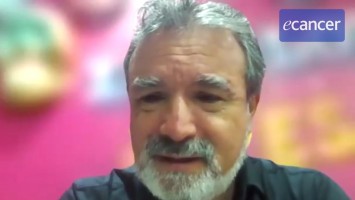Our education session is really about molecular profiling in breast cancer and what’s fascinating to me, having been involved in breast cancer treatment for twenty years now, is that on a day to day basis we are using advanced molecular profiling, tumour genomics, hereditary cancer testing and transcriptomics to make day to day decisions about how best to manage patients with breast cancer. So we’ve already alluded to two of those, one is hereditary testing to see if they have a BRCA1 or 2 mutation, very important in metastatic disease, also important in early stage to think about the issues of surgery and prophylaxis. We also talked about the recurrence score testing, a genomic profiling test build around RNA transcription. Again, we’re using it every day in the clinic. The third space we’re going to be talking about at that session is really looking at next generation sequencing of tumours because we are now learning that very specific mutations will alter the natural history of breast cancer and dictate therapy. So in women who have a PIK3CA mutation we now have a targeted drug, alpelisib, which we use to improve outcomes for women whose tumours have a PIK3CA mutation. We are learning more and more that tumours that have an ESR1 mutation, an oestrogen receptor 1 mutation, are more resistant to aromatase inhibitors. So what’s amazing is that within a few years now day to day routine clinical practice of oncology essentially depends on the most advanced, latest technology in DNA and RNA sequencing. It’s an extraordinary transformation.








